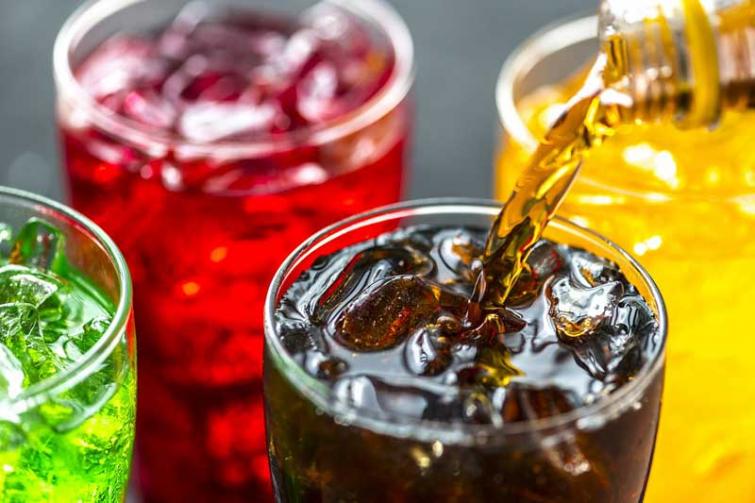
Children and teens who drink low-calorie sweetened beverages Do not save calories compared to those who consume sugary drinks: Study
Washington, May 4 (IBNS): U.S. children and teens who consumed low-calorie or zero-calorie sweetened beverages took in about 200 extra calories on a given day compared to those who drank water, and they took in about the same number of calories as youth who consumed sugary beverages, according to a study published today.
“These results challenge the utility of diet or low-calorie sweetened beverages when it comes to cutting calories and weight management,” said Allison C. Sylvetsky, PhD, an assistant professor of exercise and nutrition sciences at the George Washington University Milken Institute School of Public Health (Milken Institute SPH) and lead author of the study. “Our findings suggest that water should be recommended as the best choice for kids and teens.”
A previous study by Sylvetsky and colleagues found that children and teens frequently consume low-calorie sweeteners, not only in diet sodas but also in a variety of reduced calorie juice and sports drinks, as well as food and snack items. The 2017 study found the consumption of low-calorie sweeteners jumped by 200 percent in children and teens from 1999 to 2012. Yet despite the rise in their popularity, researchers still do not know how these sweeteners affect total energy intake or if they are helpful for weight management as they are intended to be.
To find out more, Sylvetsky and her colleagues looked at dietary recalls collected from 7,026 children and teens enrolled in the National Health and Nutrition Examination Survey from 2011 until 2016. Kids and teens reported what they ate and drank during a 24-hour period. The research team zeroed in on the reported consumption of sweetened beverages – those with low-calorie sweeteners and those with sugar.
Kids and teens who reported drinking low-calorie sweetened beverages, such as a diet soda, not only ingested extra calories compared to water consumers, but they also took in more calories from added sugars in foods and beverages compared to water consumers, the team found.
Other key findings from the study included:
After adjusting for body weight, consumption of low-calorie sweetened beverages, sugary beverages and combined consumption of both was associated with 196, 312 and 450 higher total calorie intake compared to youth who consumed predominantly water.
Consumers of low-calorie sweetened drinks, sugary beverages and consumers of both took in 15, 39 and 46 more grams of added sugar, which translates to 60, 156 and 184 extra calories from added sugar--as compared to water consumers.
No differences in calorie intake were observed between consumers of low-calorie sweetened beverages and sugary beverages.
The highest calorie intakes were reported in children and teens that consumed both low-calorie sweetened beverages and sugary beverages.
These findings are particularly important because nearly one in three kids in the United States is now overweight or has obesity, which puts them at increased risk of Type 2 diabetes and other serious health conditions. This study was not designed to show that drinking low or zero-calorie beverages causes unhealthy weight gain. Rather, the study findings suggest a link between consuming sweetened beverages (containing sugar and/or low-calorie sweeteners) and higher intakes of both calories and sugar.
While the role of diet beverages in weight management remains controversial, experts have weighed in with some practical advice for parents and kids. For example, an American Heart Association science advisory group recently advised, “against prolonged consumption of low-calorie sweetened beverages by children.”
Sylvetsky agrees with that conclusion. She says that children and teens, like people of all ages, should follow the federal government’s guidelines for a healthy diet, one that emphasizes water instead of soft drinks, plenty of fruits and veggies, and whole grains.
For a healthy alternative to sugary sodas or diet drinks, Sylvetsky suggests flavored sparkling water with a splash of 100 percent fruit juice or water with a few pieces of fruit mixed in.
The study, “Consumption of Low-calorie Sweetened Beverages is Associated with Higher Total Energy and Sugar Intake Among Children, NHANES 2011-2016,” was published May 2 in the journal Pediatric Obesity. Co-authors of the study include Jean Welsh and Janet Figueroa at Emory University and Susan Swithers at Purdue University. Talia Zimmerman, a research assistant at the George Washington University and undergraduate student at Georgetown University, also contributed to the study.
Support Our Journalism
We cannot do without you.. your contribution supports unbiased journalism
IBNS is not driven by any ism- not wokeism, not racism, not skewed secularism, not hyper right-wing or left liberal ideals, nor by any hardline religious beliefs or hyper nationalism. We want to serve you good old objective news, as they are. We do not judge or preach. We let people decide for themselves. We only try to present factual and well-sourced news.







